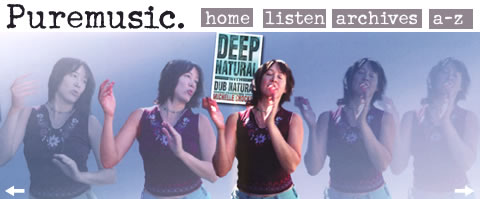
A CONVERSATION WITH MICHELLE SHOCKED (continued)
PM: I liked the insert inside Deep Natural about owning your whole catalog. It said the question is not "Why does Michelle Shocked own her entire major label catalog?" but "Why is she the only one?"
MS: It was very satisfying to see that in print there.
PM: Does that refer specifically to the battle with Mercury over Kind Hearted Woman?
MS: No, not at all. Sorry for the confusion, I caused a lot of it by my peripatetic target. What that refers to are a lot of the battles that are currently going on over artist's rights. We'd like to point out that a major label record contract is the only contract in existence of its kind today. It's akin to doing a deal with the bank when you take out a thirty year mortgage on a house, and, after it's paid for, they tell you that you have to move out -- that you don't own it.
And that's just the tip of the iceberg. The whole relationship is skewed. You read in the media about fights going on at the state level. In CA, for example, there's a clause that prohibits indentured servitude. That's the reason that a lot of CA artists are wined and dined to NYC for a big ceremony to sign contracts that aren't legal in CA. The only thing that protects you otherwise is the 13th Amendment, which is a federal law. They're now pushing the finer points of that legislation in CA. On top of all that, the record labels got an exemption independent of all other industries, so that they weren't even bound by the seven year indentured statute.
PM: So, all that said, what does owning your catalog mean? Did you do something about that that other artists need to understand and try to do, if possible?
MS: Yes, they need to know about this. It's probably too late for most of my generation, they've already been sold down the river in most instances. But for upcoming artists and future generations, it's important. When they cast you adrift, rather than floating upon a huge ocean with no oars, you've got a quick little sloop.
I'm launching a new label with this new record. But I will have what's known in the capitalist system as cash flow, that comes from the sale of my catalog. Where a lot of indie labels go down is that they put out so much money to record, manufacture, market, and promote their first or second release, and there's a 90-120 day period before any money comes back, if it comes back at all. You won't see any money from distributors for a solid year. If you don't have the cash flow to survive that period, the best laid plans will go down with the ship. By owning your catalog, you've got a sales base.
For instance, when the format changed from vinyl to CD, the people who owned the catalog profited from the winds of change that blew through the market. The whole thing crashed in the late 80s and early 90s with the consolidation of so many labels, and those that made it to the other side survived with their work intact.
PM: I really want to make sure I understand the bedrock of what you're saying. Does that mean that you own the publishing to the songs, or the master recordings?
MS: That's a good question. It took me eleven years of operating in that system to make all the necessary distinctions. There are three kinds of income for a recording artist. The first is mechanical royalties, which comes from record sales. Most artists never see any mechanical royalties, because the record companies have such an interesting way of accounting for all their expenses.
PM: Breakage, and all those clauses.
MS: Right, and you never see any mechanical royalties. That's why, in the late 80s/early 90s, when Beck got that huge advance, bigger than anybody had heard of, that's basically all the money he's ever gonna see from his mechanical royalties, in spite of massive sales figures. Because they always find ways of deducting costs in their accounting reports of your sales.
The next income stream comes from publishing, and that's where you have the edge on everyone in the business if you're a singer songwriter. If you're not a singer songwriter, you're at a huge disadvantage in this arena; you're more of a pawn in their game.
When Whitney Houston cut that Dolly Parton song ["I Will Always Love You" from The Bodyguard soundtrack], she didn't receive anything from the third income stream, which is performance royalties. I thought that because she performed the song, that this third stream came her way, but I was wrong. I knew she didn't write the song, so she wouldn't get any publishing royalties, and because of all I've laid out, I knew she wouldn't be getting any mechanical royalties, but I figured she'd be collecting performance royalties. But I came to know that the writer of the song, not the singer, makes the performance royalties as well. The performance is the broadcast, not the recording, in other words.
So, when I negotiated my contract with Mercury, I basically did a licensing deal with them. For ten years, they owned the masters and just paid me a royalty. But after ten years, ownership of the masters reverted back to me. If they want to manufacture any of those records now, they have to pay me a licensing fee, which is different than a royalty. continue
print (PDF) listen to clips puremusic home